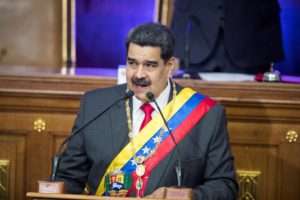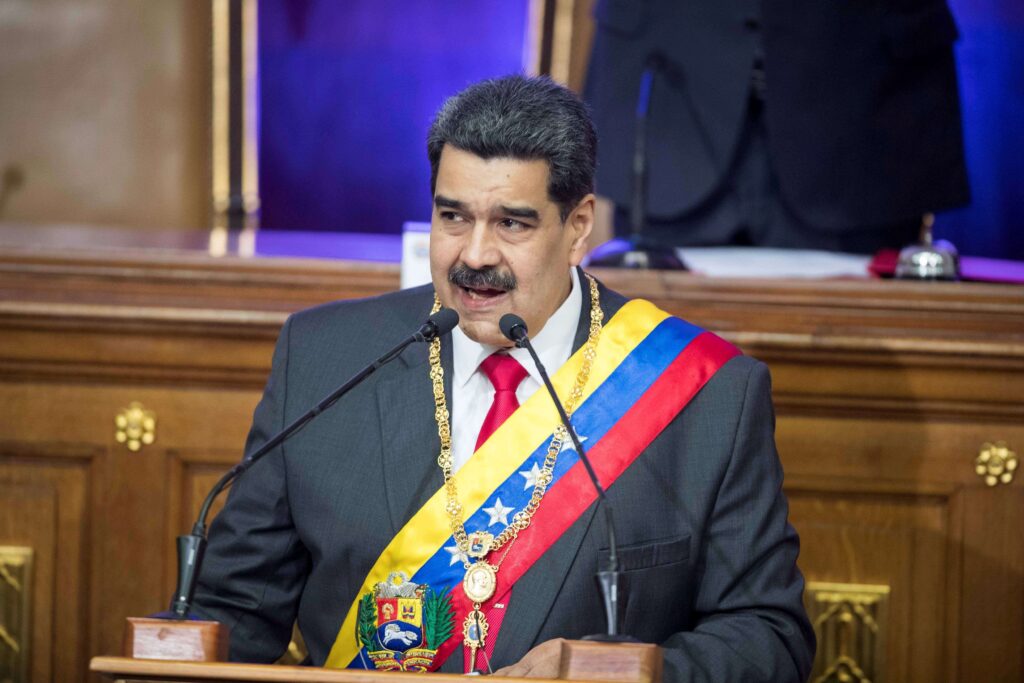

In yesterday’s election in Venezuela, an overwhelming majority of the people wanted to oust socialist dictator Nicolás Maduro, but the regime continues to hold on to power through violence and fraud. Venezuela’s socialist government has turned what was once one of Latin America’s richest countries into a suffocating hellhole, causing more than 7 million people to flee in the largest refugee crisis in the Western Hemisphere’s history. This horrific experience is relevant to the wider debate about “democratic socialism”.
A traditional response to evidence from the Soviet Union, Communist China, and other communist countries that socialism leads to poverty and oppression is to argue that these regimes failed because they were undemocratic. If government control of the economy is combined with democracy rather than dictatorship, then socialism will fulfill its promise of raising the standards of the working class. Venezuela’s history over the past 25 years tempers this optimism.
To avoid confusion, I should emphasize that what I mean by “socialism” here is government control of all or most of the economy (what Marxists call the “means of production”), not just having a relatively large welfare state . The latter also poses dangers of its own, but of a different type and scale.
Maduro’s predecessor Chavez first came to power through democratic elections in 1998 and maintained electoral democracy for a time. Gradually, however, government control of the economy and centralization of power (itself a requirement of socialism) enabled it to suppress opposition and establish authoritarian regimes. State control of the economy is a key element of this process. For example, the government used its control of food supplies to suppress opposition. If you oppose the ruling party, you are likely to starve. In an economy with few job opportunities outside the state apparatus, regime opponents also risk losing their jobs.
Meanwhile, instead of elevating the status of the working class, socialism in Venezuela has impoverished them. This process begins even before democracy is fully finished.
In a 2019 article titled “The Dangers of Democratic Socialism,” I outlined some of the reasons why democracy cannot cure socialism’s flaws, and why a socialist state cannot remain democratic for long, even if it was that way in the first place. In the following excerpt I highlight the Venezuelan example:
Maybe democracy will insulate us from any potential negative effects of putting large parts of the economy under government control…. Any aspiring American Lenin or Hugo Chavez will be voted out of office, or better yet – never elected in the first place.
Unfortunately, the democratic elements of democratic socialism are unlikely to protect us from the serious risks of socialism’s parts. Voters in a democracy can and do elect dangerous demagogues. Hugo Chavez was democratically elected.
Closer to home, our own voters elected Donald Trump. He was far from the first politically successful illiberal demagogue in American history….
A socialist state that controls much of the economy would also make it nearly impossible for voters to gain sufficient knowledge to effectively oversee the government. This would significantly exacerbate the already serious problem of voter ignorance that plagues modern democracies. In a world where most voters, for perfectly rational reasons, don’t even know basic facts (such as being able to name the three branches of the federal government), it’s unlikely that they will learn enough to properly oversee a socialist state. Instead, much of the government’s power will fall under the control of politicians, bureaucrats, powerful interest groups, or worse.
Finally, democratic socialist countries are actually unlikely to remain democratic in the long run. If a government controls a large portion of the economy, over time it can use its control of key resources to reward its supporters and silence its opponents. In fact, this is exactly what happened in Venezuela, where the government used control over food resources, among other things, to incentivize support for the regime and deter opposition.
For the reasons mentioned in the 2019 article, if democratic socialists came to power in the United States, it would be more difficult for them to establish a dictatorship in Venezuela than it was for Chavez and Maduro. But that’s largely because we face more obstacles than Venezuela does in establishing socialism itself, such as stronger federalism, separation of powers, and judicial review.
It might still be tempting to conclude that Venezuela’s tragedy is the result of flaws in its culture or character flaws in particular leaders like Chavez and Maduro. But despite differences in culture and leadership, socialist governments produced similarly horrific results in many countries around the world. Either socialism’s weaknesses are caused by systemic institutional flaws rather than endemic idiosyncrasies, or the system tends to promote bad leaders. Most likely it’s a combination of the two.
There are, of course, clear parallels between Maduro’s use of violence and fraud to stay in power after losing this election and Donald Trump’s attempt to do the same thing after his defeat in 2020. A major reason for succeeding where Trump failed is that the Venezuelan regime’s control of the economy and extreme concentration of power make it easier to suppress opposition. Trump does not control the courts and many other key institutions, and he cannot threaten his opponents with job losses and food denials. Thanks to socialism, Maduro does have these tools of coercion at his disposal. Supporters of democratic socialism would do well to consider whether they would want Trump, or someone like him, to be able to wield such power if Trump wins the election.
Despite some ideological differences, the “nationally conservative” policies promoted by Trump, J.D. Vance and others on the right pose many of the same dangers as socialism – including using state control of the economy to suppress opposition. The differences in slogans and flags between the two movements should not blind us to this underlying similarity.
There is another way in which the Venezuelan experience can give pause to both the right and the left. As in the similar case in Cuba, conservatives who rightly denounce socialist oppression should not simultaneously seek to close America’s doors to refugees fleeing the country.
Venezuelan refugees, like Cuban refugees, should not be forced into poverty and oppression simply because they had the misfortune of being born in the wrong place, to the wrong parents. And, like Cubans, Venezuelan immigrants can make valuable contributions to our economy and society—if we let them.
In sum, the Venezuelan experience should lead those on the left to reject democratic socialism, if they have not already done so. For their part, right-wingers would be better off rejecting similar ideas in the name of nationalism and adopting a more welcoming approach to Venezuelan refugees.

